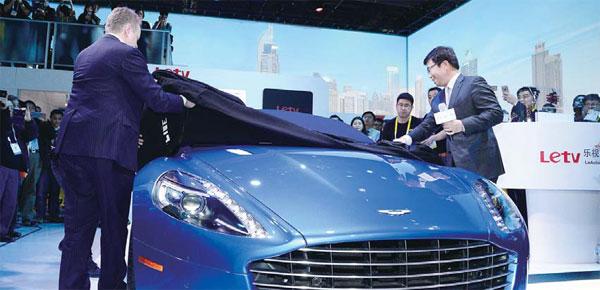 |
|
Ding Lei, global vice-chairman of LeTV Super Car, and Aston Martin CEO Andy Palmer, introduce the in-car entertainment and connected car tech in the Rapide S at the CES in Las Vegas. [Photo/agencies] |
More and more Chinese Internet companies are working closely with the automobile industry to provide innovations for a sector seeking a technological facelift.
In recent months, Pateo, one of China's largest providers of products for connected cars, and Leshi Internet Information and Technology, also known as Letv, have begun working with Ford, Chery and Aston Martin on infotainment systems.
In January last year, Alibaba teamed up with SAIC, while Uber teamed up with GAC in December. Baidu and BMW also tested their first autopilot system in December.
The moves are in line with the nation's Internet Plus strategy, in which traditional manufacturers and businesses are incorporating technology to drive economic growth.
According to a Boston Consulting Group report in October, Chinese customers are the most openminded in the world in accepting innovative functions in vehicles. Chinese customers, the report found, are also willing to pay more for them.
"Car manufacturers are going to be hardware producers and device suppliers, while the Internet players will own the customers in the future," said Thomas Dauner, global leader of BCG's automotive practice.
Deloitte China's automotive group managing partner Marco Hecker agreed.
"Automobiles nowadays have been developed beyond a vehicle taking people from one place to another. They've become a customer's companion on their journeys. The customer experience is fundamental for survival and growth and building a strong auto brand in the Chinese market."
Cao Junbo, chief analyst at IResearch Consulting Group, said in the near future vehicles with intelligent driving systems could be as commonly used as the smartphone.
"But the technology is still in its early stages," Cao said.
IResearch analyst Zhou Xin said more venture capital and private equity firms will be attracted to projects that bring together automakers and high-tech companies.
"This year and the next are the most critical periods for the relationship between the auto industry and the Internet. As long as the automobile industry keeps developing this year, investment to the upper stream of the auto industry will develop and there will be new players joining."
The upper stream of the industry that Zhou is referring to comprises the original equipment manufacturers, auto financing firms and parts suppliers that he said are slow to adapt to Internet innovations.
Online trading
Deloitte China found that China's Generation Y, also called the millennial generation, look at both online and traditional channels for information. Forty percent of them use the Internet to buy cars. Deloitte said China's Generation Y is going to become the dominant customer group in 10 years.
IResearch estimated that about 740,000 units of new car sales were made over the Internet last year, double the figure from 2014. It also said last year's Internet sales contributed 3 percent to overall auto sales.
The Chinese research firm found that 450,000 used cars were traded online, a rise of 74 percent year-on-year. It predicts the volume of used cars being sold online may double this year to 900,000 units.
O2O after market
Last year, investors clamored after the automotive aftermarket industry, especially in e-commerce. E-commerce startups in the industry attracted about $220 million in 2015, according to industrial data.
IResearch estimated that the online-to-offline aftermarket had a value of 5.1 billion yuan ($744.48 million) in 2015, a surge of 179 percent from the same period in 2014. It also estimated that the market will balloon to 11.2 billion yuan this year, with growth rates lowering to 121 percent this year and 72 percent for 2017.
"The explosive growth in the sector will come to an end. We are looking at speedy but stable development ahead," Cao said.
